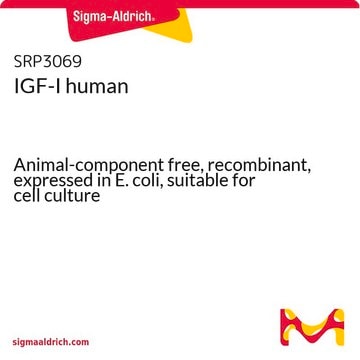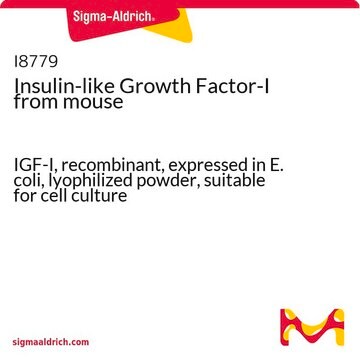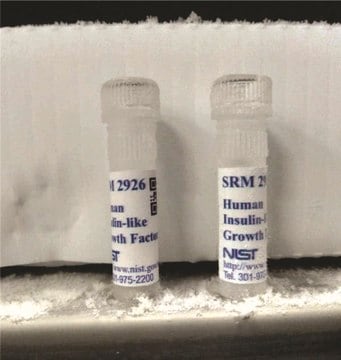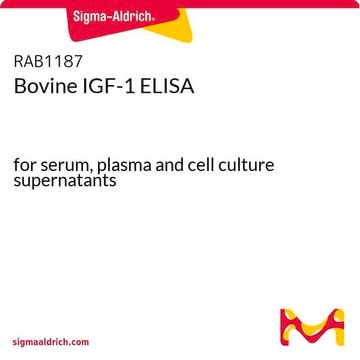GF306
IGF-I Protein, Human Recombinant Animal Free
The Insulin-like growth factor I protein(or IGF-1 protein), also known as somatomedin C, is the dominant effector of growth hormone & is structurally homologous to proinsulin. Manufactured using all non-animal reagents.
Synonym(s):
IGF-1, IGF1, Insulinlike Growth Factor I, Insulinlike Growth Factor 1, Mechano growth factor, Somatomedin-C, IGFI
Sign Into View Organizational & Contract Pricing
All Photos(1)
About This Item
UNSPSC Code:
12352202
eCl@ss:
32160405
NACRES:
NA.77
Recommended Products
Quality Level
Assay
>98% (SDS-PAGE and HPLC)
impurities
<0.1 μg/mg protein endotoxin (<1EU/μg)
NCBI accession no.
UniProt accession no.
shipped in
dry ice
Related Categories
General description
Insulinlike growth factor I, also known as somatomedin C, is the dominant effector of growth hormone and is structurally homologous to proinsulin. The IGFs are mitogenic polypeptide growth factors that stimulate the proliferation and survival of various cell types including muscle, bone, and cartilage tissue in vitro. IGFs are predominantly produced by the liver, although a variety of tissues produce the IGFs at distinctive times. The IGFs belong to the Insulin gene family, which also contains insulin and relaxin. The IGFs are similar by structure and function to insulin, but have a much higher growth-promoting activity than insulin. IGF-II expression is influenced by placenta lactogen, while IGF-I expression is regulated by growth hormone. Both IGF-I and IGF-II signal through the tyrosine kinase type I receptor (IGF-IR), but, IGF-II can also signal through the IGF-II/Mannose-6-phosphate receptor. Mature IGFs are generated by proteolytic processing of inactive precursor proteins, which contain N-terminal and C-terminal propeptide regions. Recombinant human IGF-I and IGF-II are globular proteins containing 70 and 67 amino acids, respectively, and 3 intra-molecular disulfide bonds.
Product Source: E. coli
Specificity
Cross Reactivty
Mouse, Rat, Horse, Pig, Cow, Sheep, Monkey, Chicken, Tiger Salamander, Bacteria, Frog
Mouse, Rat, Horse, Pig, Cow, Sheep, Monkey, Chicken, Tiger Salamander, Bacteria, Frog
Application
Research Category
Stem Cell Research
Stem Cell Research
Research Sub Category
Growth Factors & Receptors
Growth Factors & Receptors
Quality
Bioactivity assay: The ED50 was determined by a cell proliferation assay using FDC-P1 cells is ≤ 2.0 ng/ml, corresponding to a specific activity of ≥ 5 x 105 units/mg.
Physical form
Product is filtered through a 0.2 micron filter before lyophilization.
Recombinant animal free human IGF-I is manufactured using all non-animal reagents
Storage and Stability
Store at -20°C for up to 6 months from date of receipt.
Disclaimer
Unless otherwise stated in our catalog or other company documentation accompanying the product(s), our products are intended for research use only and are not to be used for any other purpose, which includes but is not limited to, unauthorized commercial uses, in vitro diagnostic uses, ex vivo or in vivo therapeutic uses or any type of consumption or application to humans or animals.
Storage Class Code
11 - Combustible Solids
WGK
WGK 3
Flash Point(F)
Not applicable
Flash Point(C)
Not applicable
Certificates of Analysis (COA)
Search for Certificates of Analysis (COA) by entering the products Lot/Batch Number. Lot and Batch Numbers can be found on a product’s label following the words ‘Lot’ or ‘Batch’.
Already Own This Product?
Find documentation for the products that you have recently purchased in the Document Library.
Yan Li et al.
Journal of ovarian research, 15(1), 94-94 (2022-08-14)
This study intended to clarify the mechanisms by which WISP1-mediated IGF1/αvβ3/Wnt axis might affect the progression of ovarian cancer. Bioinformatics analysis was implemented for pinpointing expression of IGF1 and WISP1 which was verified through expression determination in clinical tissue samples
Ruo-Xu Liu et al.
Neural regeneration research, 15(9), 1709-1715 (2020-03-27)
Microglia, as the resident immune cells in the central nervous system, play important roles in regulating neuronal processes, such as neural excitability, synaptic activity, and apoptotic cell clearance. Growth factors can activate multiple signaling pathways in central nervous system microglia
Jong-Ho Lee et al.
Nature communications, 8(1), 949-949 (2017-10-19)
Phosphofructokinase 1 (PFK1) plays a critical role in glycolysis; however, its role and regulation in tumorigenesis are not well understood. Here, we demonstrate that PFK1 platelet isoform (PFKP) is the predominant PFK1 isoform in human glioblastoma cells and its expression
Our team of scientists has experience in all areas of research including Life Science, Material Science, Chemical Synthesis, Chromatography, Analytical and many others.
Contact Technical Service







